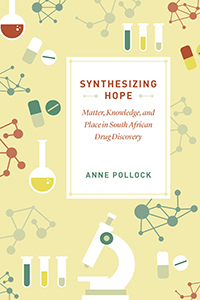
Co-sponsored by Georgia Tech’s School of History & Sociology and Emory’s Department of Women’s, Gender, and Sexuality Studies
All are welcome for the Atlanta Book Launch of Anne Pollock’s Synthesizing Hope: Matter, Knowledge, and Place in South African Drug Discovery, recently published by the University of Chicago Press. The event will be chaired by Jennifer Singh, and will present comments by the author and an insightful pair of respondents: Professor Dennis Liotta, a drug discovery scientist featured in the book’s account, and Amit Prasad, a sociologist of postcolonial science. The audience will be encouraged to join in the discussion, and to continue the conversation over drinks and nibbles.
Monday, September 9th, 2019
4-5:30pm
Georgia Tech, Stephen C Hall Building, Room 102
215 Bobby Dodd Way NW, Atlanta, GA 30332
https://www.press.uchicago.edu/ucp/books/book/chicago/S/bo38181532.html
https://hsoc.gatech.edu/speakers-series-fall
Synthesizing Hope opens up the material and social world of pharmaceuticals by focusing on an unexpected place: iThemba Pharmaceuticals. Founded in 2009 with a name taken from the Zulu word for hope, the small South African startup with an elite international scientific board was tasked with drug discovery for tuberculosis, HIV, and malaria. Anne Pollock uses this company as an entry point for exploring how the location of scientific knowledge production matters, not only for the raw materials, manufacture, licensing, and distribution of pharmaceuticals but also for the making of basic scientific knowledge. Consideration of this case exposes the limitations of global health frameworks that implicitly posit rich countries as the only sites of knowledge production. Analysis of iThemba identifies the problems inherent in global north/south divides at the same time as it highlights what is at stake in who makes knowledge and where. It also provides a concrete example for consideration of the contexts and practices of postcolonial science, its constraints, and its promise. Synthesizing Hope explores the many legacies that create conditions of possibility for South African drug discovery, especially the specific form of settler colonialism characterized by apartheid and resource extraction. Paying attention to the infrastructures and laboratory processes of drug discovery underscores the materiality of pharmaceuticals from the perspective of their makers, and tracing the intellectual and material infrastructures of South African drug discovery contributes new insights about larger social, political, and economic orders.
